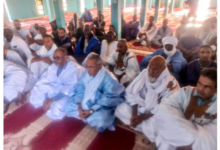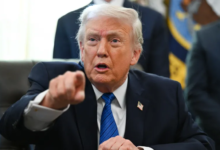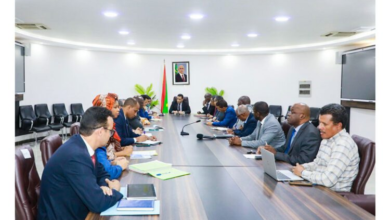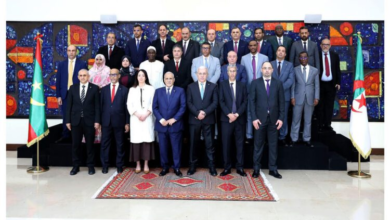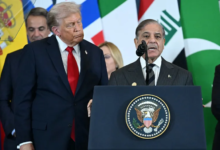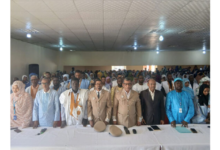Opening of the Third Edition of the Cinema and Human Rights Festival

His Excellency the Minister of Culture, Arts, Communication, and Relations with Parliament and Government Spokesperson, Mr. El Houssein Ould Meydou, inaugurated this evening, Sunday, at the “Mokhtar Ould Daddah” International Conference Center, the activities of the third edition of the Cinema and Human Rights Festival, held under the theme “Childhood First.”
The festival aims to shed light on humanitarian and social issues affecting society through seven national films that tell authentic stories voiced by creative talents striving for change, alongside sixteen international films that portray human experiences, pains, joys, and dreams.
This edition includes competitions for cinematic films and television reports focusing on children’s rights, as well as a special contest for audiovisual advertising spots. Additionally, training workshops are organized, and several figures prominent in the cinematic field are honored.
In his speech on the occasion, the Minister emphasized that this festival, with its noble theme and guests comprising artists and human rights advocates, represents a bridge between art and values, between creativity and duty. He affirmed that justice is not found only in legal texts but also in the details of the scene, in the tone of voice, and in silence when it speaks louder than words.
He added that the event serves as a platform for dialogue and reflection, and a podium to celebrate cinematic works that align with humanity and restore dignity to its major issues.
The Minister clarified that cinema, in its essence, goes beyond mere aesthetic entertainment; it becomes a cultural practice that questions reality, opens windows of hope, and reshapes collective consciousness through the language of image, movement, and symbolism.
He noted that today, cinema, alongside other art forms, has become one of the most profound and effective means of defending rights and one of the most efficient tools for promoting a culture of peace, justice, freedom, and equality.
The Minister affirmed that His Excellency the President of the Republic, Mr. Mohamed Ould Sheikh Ghazouani, accords culture its deserved place and attention, considering it the engine of collective awareness and a tool for instilling values of belonging, fraternity, and solidarity. He made culture a cornerstone in his ambitious societal project. The government of His Excellency the Prime Minister, Mr. Mokhtar Ould Dahi, has been keen to implement this ambitious vision through coherent and mature cultural policies and strategies. Among the outcomes of these efforts were the establishment of the “Jol Cultural Festival” and the addition of a developmental dimension to both the “Mada’in Heritage Festival” and the “Jol Festival,” benefiting the four cities classified as World Heritage sites by UNESCO, alongside the historically symbolic city of Jol.
The Minister stressed that the government’s commitment to fostering cultural diversity is reflected in strengthening national cohesion by establishing a National Day for Cultural Diversity, celebrated annually with the participation of all components of the national spectrum, in a joyful tribute to linguistic, artistic, and inherited traditions that form a captivating national mosaic enriched by diversity.
He mentioned that among the achievements of this luminous path is the registration of the Mauritanian “Mahadra” on UNESCO’s Intangible Cultural Heritage list, as well as the epic of “Samba Gladio,” symbolizing heroic and unifying values that link the Arab and African rivers, reinforcing the cross-border nature of our shared national culture. Moreover, the adoption of the Soninke language as a transcontinental language reflects the deep civilizational extension of an essential component of our unified national identity.
The Minister also highlighted the establishment of the President’s Prize for Fine Arts, the creation of a National Institute and Central Administration for the Arts, and the issuance of a professional artist card, which will decisively end the dilution of the art profession. He pointed to ongoing efforts to enhance the infrastructure supporting media and cultural work, including the construction of a Palace of Culture, a Press House, cinema centers, cultural and heritage villages, and theaters.
For his part, Mr. Mohamed Ould Cheiker, President of the International Nations Festival for Cinema and Human Rights, stated that justice, dignity, freedom, and equality are fundamental values that we must all work to consolidate in our societies—not merely as slogans but as principles that require continuous effort and education for future generations.
He added that this edition will address significant issues related to the reality of human rights through an intellectual symposium highlighting social and legal challenges, which will have a profound impact on raising awareness and encouraging active participation in this field.
He explained that the role of filmmakers is incomplete without the participation of the press, noting that the festival management has introduced a special competition for television reports in cooperation with the Family Channel on children’s rights, in addition to the regulatory authority’s support for a contest on audiovisual advertising spots.
The opening ceremony was attended by a number of officials from the Ministry of Culture, Arts, and Communication, as well as cultural and cinematic stakeholders in the country.

